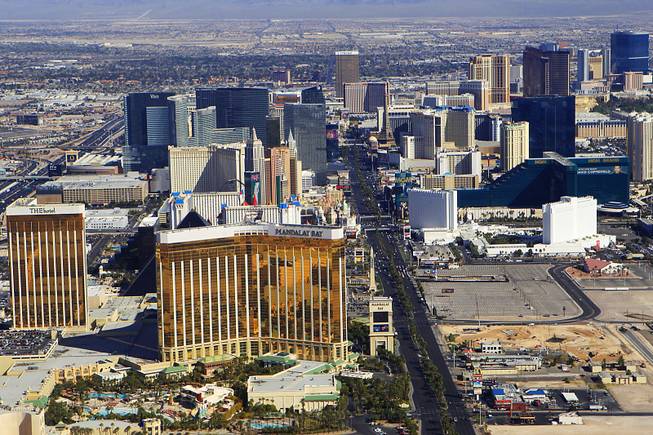Wednesday, Jan. 14, 2015 | 2 a.m.
In its first week back, there was one thing virtually all of Congress could agree on: Las Vegas casinos and other large commercial businesses should be protected financially from a major terrorist attack.
A bill to restart a federal program helping to do just that passed the new Republican Congress last week and was signed into law by President Barack Obama on Tuesday.
The legislation renews a 2002 federal program that promises insurance companies the government will step in to help pay for damage above $200 million in the event of terrorist attacks against a major commercial business.
Created after 9/11, the program encourages insurance companies to offer casinos, shopping centers, hospitals, stadiums, universities and hotels coverage for major terrorist attacks.
All of Nevada's congressional delegation supported the Terrorism Risk Insurance Act, or TRIA. The act has major implications for Las Vegas' economy, the state of Nevada and major cities across the nation. Here's why:
Terrorism is a real threat to Las Vegas casinos
The idea that terrorists would single out the Strip for an attack is hopefully far-fetched — but it’s not entirely unsubstantiated, either.
Last year, an English-language Al Qaeda magazine instructed readers how to make car bombs and suggested Las Vegas casinos as targets. And some of the 9/11 hijackers visited Las Vegas in the months leading up to the attack.
Beyond those specific connections, however, casinos in general are at risk because they’re so big. Scores of customers who could become victims pass through every day, and if a casino did endure an attack, the cost of recovery could be devastating.
For Caesars Entertainment, which oversees nine casinos on or near the Strip, the insurance is welcome even if a terrorism attack might be unlikely.
“Casinos are a potential target, as are other businesses, for terrorists because there are large numbers of people who are potential victims,” said Gary Thompson, Caesars spokesman. “The need for federal protection from terrorist attacks in terms of insurance liabilities is critical, because it could put a company out of business if an attack were launched on a casino.”
It could also cripple the state economy, which is heavily reliant on the business generated by the casino industry.
"If a terrorist attack were to occur," said Sen. Dean Heller, a Nevada Republican who helped push the bill in the Senate, "our entire state economy would be devastated without TRIA."
The law is touted as a job creator
Before casinos or hotels can get loans to expand, they often have to prove to banks they're insured for a terrorist attack. But insurance companies have been reluctant to offer such coverage because the payout would be massive. That's why Congress stepped in with the program in 2002.
In 2014, Congress battled all year on the program's specifics. Lawmakers actually left town in December without a deal, and the program expired at the end of the year.
That created a lot of uncertainty for new Las Vegas projects, which theoretically could have had to put plans on hold without the terrorism insurance protection.
"If TRIA was not in place," said Paul Moradkhan, vice president of government affairs for the Las Vegas Metro Chamber of Commerce, "the whole construction and development of new projects in Southern Nevada would have to be halted."
The American Gaming Association, a Washington, D.C.-based trade group for casinos, made a similar argument while pushing for renewal of the legislation.
“Without TRIA, the gaming industry will face costly difficulties in obtaining coverage, often required for critical community investments,” Geoff Freeman, the gaming association’s chief executive, wrote in a letter to leaders of the Senate Banking Committee last June.
The gaming association is part of the Coalition to Insure Against Terrorism, a group of businesses and organizations that came together to support the initial passage of TRIA as well as each of its subsequent extensions.
In November, the gaming association says it led meetings with several lawmakers — including Heller, Nevada’s Rep. Joe Heck and policy staff for Sen. Harry Reid — to advocate for TRIA’s importance to gaming. The gaming association also says it helped get “dozens” of members of Congress on board with the reauthorization of TRIA.
This latest bill keeps the program for another six years. All of Nevada's congressional delegation voted for it. Las Vegas Democrat Rep. Dina Titus, who helped push the bill in the House of Representatives, said she'd like to see the program extended permanently so this uncertainty doesn't happen again.
It sends an olive branch to the business community
Washington bickering these past few years over everything from taxes to financial rules has left a bad taste in the business community's mouth.
Businesses large and small have complained they can't plan for the long term because they don't know what regulations they'll have to live by year to year.
Things seemed to hit a low point when Congress let terrorism risk insurance protections expire in December.
But Congress got its act together and passed the bill its first week back. Some took it as a sign of commitment from this Congress to focus on more business issues.
"The fact they've taken action so quickly is definitely a great message to business community," Moradkhan of the Las Vegas chamber of commerce said.


Join the Discussion:
Check this out for a full explanation of our conversion to the LiveFyre commenting system and instructions on how to sign up for an account.
Full comments policy